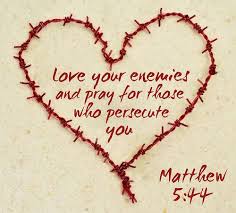Valentine’s Day Homily on Nonviolence and Love of Enemies
Homily Feb. 19, 2017 Loretto Motherhouse
We’ve just passed Valentine’s day, lots of little red hearts floating around, they all say I love you. But if you asked “What exactly IS this love you’re passing around?” it would be hard to explain. We’d think of Paul’s beautiful words to the Corinthians: “love is patient, love is kind…” We’d think of people who are dear to us. We’d allow that love can be a high, it can be gentle and tender, it can be sweet; or it can be “tough love”, it can be painful, difficult…well you know all of that.
Today’s readings, though, seem to put us in a different frame. I’d have liked to talk about something else, but they nearly force us to face into these words of Jesus. “Do not bear hatred in your heart,” “take no revenge and cherish no grudge,” “love your neighbor as yourself,” “love your enemies and pray for those who persecute you, “give to the one who asks of you,” “be perfect as God is perfect” – (according to one writer, this means “be all-inclusive in love as God is all-inclusive.” Jesus has broadened the border from the sweetly personal and intimate, which is where we usually like to think of love, to something way larger. Something we might call political. Something critical not just to individual, private life, but to public, corporate life.
We’re learning that what we call “the Golden Rule” – “Do unto others as you would have them do unto you” is the single most foundational ethical message that ALL religions – including Christianity – offer to humankind. But we’re conditioned by centuries of tit-for-tat, eye-for an-eye notions of justice. Most of us would have been taught that Jesus’s examples – turning the other cheek, giving your cloak as well as your coat, going the farther mile – advise us to give in to domination, to be passive, don’t fight back. Contemporary scholars, however, tell us that Jesus is recommending clever, subtle, peaceful, non-violent ways of resisting evil when we are faced with it. Jesus as he is dying, prays “Forgive them, for they know not what they do.” Jesus invites us to a largeness of heart that never gives up possibilities for change. He urges us to find creative ways of reaching out in love to enemies.
Jesus has moved Love as personal into the public, political arena. Jesus brings LOVE into the area of power. Who are our enemies? “unfriendly” nations, or, as many experience these days, our own national leaders. Does God expect me to LOVE persons whose intentions are completely incompatible with my own?
I believe Jesus would say Yes. Love them.
So maybe the hardest question we face now is: What does it mean for me to love THESE enemies?
Think how speedily – and how radically – our culture has changed in less than a year’s time. Numbing confusion, jumbling of truth and falsity, overridingf social conscience, condonng meanness and vulgarity. What we presumed was a national ethic has just sluffed off without our noticing. And as we change, we are creating the futures – personal, but also collective, evolutionary, even planetary futures.
I read that a senator recently raised a simple question: Have we become unable to talk to each other? That question is the emergence of hope. When our concern turns – not to despair but to re-pair, to healing; when we very consciously turn our hearts’ energies to love. Scientists have found that when HEARTS are aligned with each other, they generate a “coherent electromagnetic wave” in the local field that draws people together. In other words, with our love, we “feed” a field of love around us. What if we each made a real commitment to take time to ask this question: Am I, this day, open to loving the enemy? Can I find compassion in my heart that would enable me to think, perhaps, of the background of each of those “enemies”, and imagine some intervention of love into their life that could change it, open it to peace, gentleness, love?
But might this time of confusion be destined to wake us from a cultural sleep? Some of us remember the Vietnam war, just some 50 years ago, remember the peace movement? I remember learning the word non-violence – a word I’d heard only associated with a man in India. I remember the Berrigans, that I was shocked to learn that going to prison could be an act of courage, a prophetic act. We have come a distance. We have learned that love is a power that has political clout. Even the Vatican has begun to re-consider our allegiance to “just wars.” We know non-violence works. We know that humans hold the power of the life and death of the planet in our hands.
Maybe – just maybe – now we might be graced to love our enemies. Ethicists say that moral development depends in part on what they call a “choke reflex.” When the consequences of cultural patterns of behavior begin to be recognized as destructive, when our lifestyles are obviously damaging, we begin to “choke” on it. Now we know – I don’t need to list our country’s collective failures in areas of justice and peace. Maybe now we begin to say to one another: “I / we can’t let this continue.”
And that is the turning point: that is when HOPE begins to emerge – the moment we wake up, and turn to each other, awaken each other. When we re-member: care, acceptance, sharing. We begin to realize “we’re all in it together.” We begin to con-vert, con-verse, co-operate, col-laborate, com-municate – all the co’s.
“Love your neighbor as yourself.” “You ARE the temple of God…the holy presence of God.” Isn’t that, after all, the deepest purpose of gathering this morning in community, in communion – to share this meal whose whole intention is to energize, to deepen the power of Divine Love in us together?
May it be so.
TEXTS: Lev. 19:1-2, 17-18 Elaine Prevallet SL
Cor. 3:16-23
Mt. 38-48



